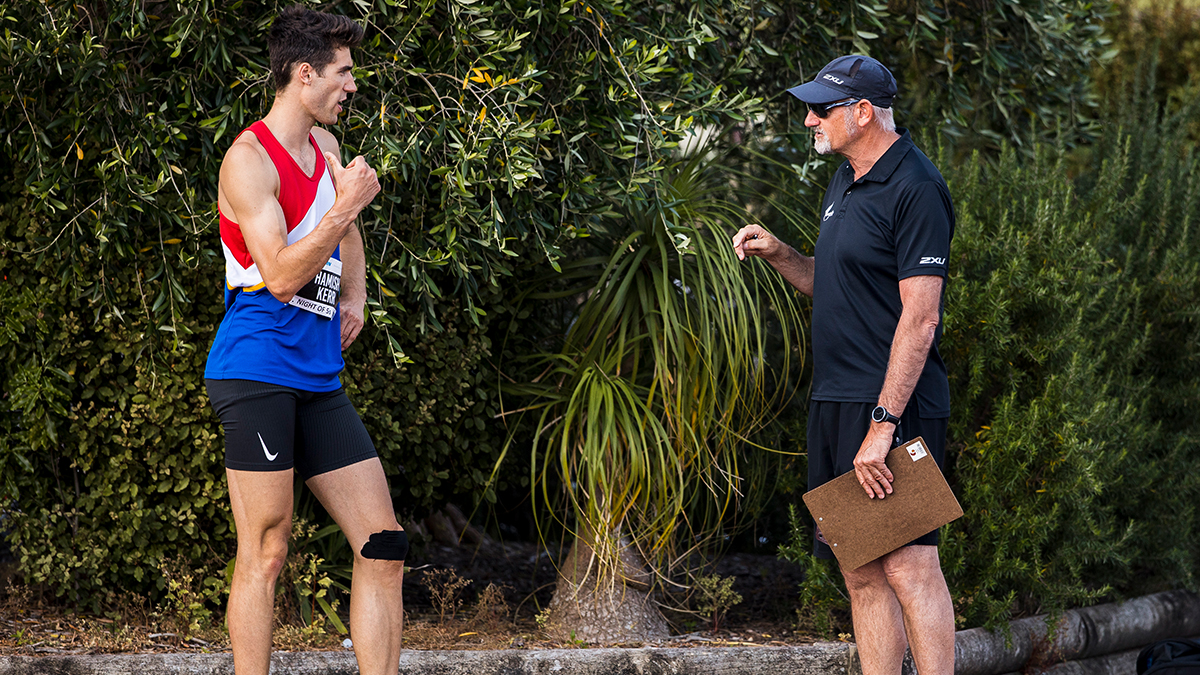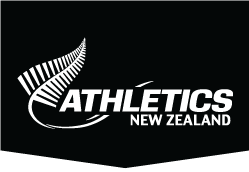News & Updates
Terry shares his lengthy and accomplished coaching journey

Terry Lomax with one of the athletes she coaches during the Night of 5s, high jumper Hamish Kerr (Photo: Alisha Lovrich
In a distinguished 45-year coaching career Terry Lomax has coached a raft of athletes to national medals and international success but the one element missing from his considerable coaching CV was to have guided an athlete to a podium spot on the global stage.
All that changed earlier this month when Hamish Kerr equalled his national record mark by popping over 2.31m and earning a share of the bronze medal with Olympic champion Gianmarco Tamberi of Italy.
It was a moment of rich reward for one of New Zealand’s most highly respected coaches, so how does the proud Cantabrian feel about the accomplishment.
“I suppose it is affirmation that you do know what you are talking about,” adds Terry. “I think all coaches suffer from imposter syndrome and occasionally you need something like this to go, hey, maybe I have got a few good ideas. But for me guiding athletes to global medals isn’t a measure of how good a coach you are. You can sometimes be lucky that a super-talent arrives on your doorstep. A much greater reflection of my coaching career are those athletes who perhaps weren’t naturally that great but athletes who I managed to improve through their persistence and perseverance.”
Born and raised in Christchurch, Terry first engaged in athletics around the age of seven after his sister Jeanne was given the responsibility of taking him to the local Marist AC to help manage his “hyperactive” nature and to “get out of mum and dad’s way.”
It proved a masterstroke as he developed into “the fastest kid in Canterbury” and an accomplished long jumper.
“I was a sports nut, I just loved playing all sport,” he recalls. “Athletics is such a natural sport that if you are a young kid and you can jump or throw far or and run fast, it is a great form of physical activity.”
However, it was not as a sprinter or as a long jumper where Terry would later specialise but as a high jumper. Initially trying the event by jumping into a sawdust pit at primary school he quickly developed a fondness for the discipline.
He won junior high jump gold at the inaugural New Zealand Secondary Schools Championships in his home city of Christchurch in 1973 and would later go on to set a New Zealand senior high jump record of 2.05m while competing at the 1976 New Zealand Secondary Schools Championships to further illustrate his exciting potential.
He later won three New Zealand senior high jump titles (1978-80) and in 1981 set a national record of 2.15m in Christchurch – a mark which still stands joint fifth on the all-time New Zealand lists – to become the first Kiwi to jump seven feet. He continued competing for the next 17 years only stopping at the age of 40 after snapping a patella tendon.
Yet Terry – who also played various other sports including rugby, basketball and volleyball – had not only been competing he had been simultaneously honing a successful coaching career which began back as a student at Christchurch Boys’ High School.
“When I was around the age of 17 or 18, I started coaching a young high jumper, Bill Martin, who was about three or four years younger than me. I just think I had a natural propensity for coaching. My true coaching career began at Casebrook Intermediate School when in Form Two I started coaching my class girls softball team!”
After leaving school he continued to coach and recalls Angele Pule, who went on to be a World Cup winning member of the Silver Ferns squad in 1987, and a young high jumper Stephen Muir who would go on to win national age-group titles as his first “proper” coaching roles.
“I would say Angela was one of the most talented female sportswomen New Zealand has ever seen,” adds Terry. At the 1981 Pacific Conference Games she led Grazyna Rabsztyn, the world record-holder at that time, over the first two hurdles before she crashed into the third hurdle. She was an extraordinarily talented girl who could also high jump 1.82m.”
In his early years he learned a lot from his former high jump coach, Alan Tucker as well as other Canterbury-based coaches Barry Hunt, Jeff Bailey, Paul Davies and Valdy Briedis.
Lucky to be able to learn from their knowledge base, he gradually evolved his coaching style and his philosophy, so what is it that Terry loves about coaching?
“I try to think of the sport as the medium and for me it is more about the development of people,” he says. “If I can help them fulfil their potential and develop them as people then that is the biggest gratification.”
Throughout the 1990s – when he worked as a PE teacher at Christchurch Boys’ High School – he stepped up his coaching to another level. During this decade he coached numerous national medallists but is probably best associated as the man who guided Mark Keddell to seventh and fifth at successive World U20 Championships.
“He was our most talented sprinter and but for injury would have gone on to achieve a lot more.”
In 2000 Terry got an opportunity to work overseas after successfully applying for a regional performance manager role with UK Athletics. For the next nine years he worked for the organisation in a range of roles where he continued to expand his athletics experiences.
“It was the best decision of my life going over there,” explains Terry. “My son was born there, I met my partner there and it was good to be able to concentrate on athletics coaching rather than having to also juggle work demands.”
During his time in the UK he built up managerial experience as co-team leader of the British team at the 2002 World U20 Championships in Kingston, Jamaica. He worked with many top athletes including 2012 Olympic high jump silver medallist Robbie Grabarz and as lead high jump coach was very proud that Britain had three finishers in the top ten of the men’s high jump at the 2008 Olympic Games led by silver medallist Germaine Mason.
In 2009 he left the UK to return home to take up a position as Performance Development Manager with Athletics NZ but was buoyed by his experiences overseas for the best part of a decade.
“I went over to the UK with the impression they had the best coaches in the world. They had many famous athletes, but the longer I was there the better coach I thought I was. Not because I’d developed during my time, but because I realised they were not necessarily better than I was.”
For the past 13 years Terry has worked for Athletics NZ in a number of different roles including as Performance Development Manager, Campaign Manager – where he was working with coaches and their top athletes to assist them in the key planning process. Putting into practise his background as an educator he has enjoyed the challenges of “preaching the gospel” of what he has learned.
Yet he is perhaps best known in New Zealand and more particularly Christchurch for his work out on the track as a pure coach.
After arriving back in New Zealand, he put in place a programme at Old Boys United AC to help ease the transition of athletes from a junior to senior level in an effort to put a brake on the rapid drop off of competitive athletes into senior athletics. From this programme he has helped nurture national medallists Marcus Wolton, Jared Neighbours and Max Attwell – all of whom he still coaches as part of his ten-strong squad today. Other members include multi-eventers Maddie Wilson and Christina Ryan, high jump duo Keeley O’Hagan and Josephine Reeves, multi-eventer Masaki Tomooka, decathlete Jack Henry, whom he shares coaching duties with his father, Peter, and 800m runner Dylan Forde “in my hobby event.”
Yet his leading athlete in the group is Hamish – an athlete he first began working with in 2018. Over the past three-and-a-half years the 2.31m high jumper and national record-holder has gradually improved leading to the point where last month he became the first New Zealand high jumper in history to win a medal on the global stage at the World Athletics Indoor Championships.
Terry first witnessed Hamish when he won the 2015 national senior high jump title in Wellington and he liked what he saw in the then 18-year-old athlete.
“You could see then he was a nice high jumper, he did it effortlessly he was tall,” confident, explains Terry. “Then later seeing him at the (2017) World University Games there was something about him that ticked a lot of boxes in terms of his physical potential not only as a person but also an athlete, and I think we are seeing that potential emerging now not only in terms of his high jumping but his development as a person. After he jumped 2.30m to win the Oceania title in 2019 I said that’s a guy who could jump 2.35m. Watching him now in training I’d say he’s capable of 2.40m and winning gold medals.”
Without question the journey of Hamish and Terry together in the coming years will be one of the most compelling storylines in New Zealand athletics in the coming years.
Yet consistent to his philosophy, Terry, who today works as Athletics NZ lead coach for combined events and jumps, says he got the same thrill out of Keeley O’Hagan setting a personal best of 1.88m to win the women’s high jump title at the New Zealand Track & Field Championships as he did Hamish grabbing bronze in Belgrade.
Admitting his coaching style is more continental European in style than British – one of his key mentors was former New Zealand Director of Coaching in the 1980s Hungarian Dragan Ivanov – he fully intends to continue coaching into the future.
However, of all the wide range of events he coaches, does he have a favourite?
“It varies. I enjoy coaching hurdles I’ve really started to enjoy coaching the throws having been exposed to Dale (Stevenson) and Kim Mickle (Athletics NZ Throws Coaches), I really enjoy technical events; the sprints, pole vault.
“I think the best way to describe me is I’m an athletics coach – which is a bit like being a teacher. The events are like the subjects and if you can teach, you should be able to teach anything.”
